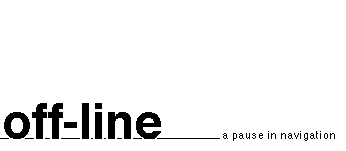 |
 |
October, 1999 |
 |
 |
October, 1999 |
| Giancarlo Livraghi gian@gandalf.it |
|
| |
||
|
There are three ideas that have been turning around in my mind for a few years; and they are quite closely related to each other. Trends in the net are new things with old roots. The internet is a biological system. And the network economy is more like farming than like manufacturing. Maybe, I thought, I had some "original" thinking. I'm more pleased than disappointed to find that several other people have the same ideas. John Perry Barlow wrote in Wired in 1988 that to understand the new economy we must think about agriculture. In my belief – originating in my own personal leap from the 19th century to the 21st – the mental habits of agriculture are much more conductive to understanding the essentially biological qualities of the information economy than is the mechanical skull vice of the industrial world-view. Thomas Malone (head of MIT's Center for Coordination of Science) talked about cultivation in an interview in July 1998. If we believe that top-down, centralized management will become less and less common, the question becomes: what could take its place? The notion of cultivation. Kevin Kelly in New rules for the new economy defined electronic networks as an ecology of organisms. Everyday we see evidence of biological growth in technological systems. This is one of the marks of the network economy: that biology has taken root in technology. And this is one of the reasons why networks change everything. Jerry McGovern in The Caring Economy (1999) says that we are going back to the "community networks" of the agricultural age. What goes around, comes around, they say. It could also be said that we move forward only to return, at least partly, to some place in the past. The internet is a network – an organic place. It makes sense to cooperate. It makes sense to cultivate. On October 5, 1999, in a meeting in Milan about "technologies and people", Arno Penzias (Nobel prize for physics and for many years vice-president for research at Bell Laboratories) talked about an agricultural society in a world of new technologies. Urban concentration and centralized production, caused by the industrial economy, are a short intermission in the history of humanity. With our new communications systems we are not going back to the economy of agriculture, but to the workplace and the home coming back together, to small communities: the lifestyle of farmers. When my son was a child – said Penzias – he saw me go out in the morning and take with me toys that needed to be fixed; so he thought my job was repairing toys. Now he and his wife run a publishing house; their office is in their home and they take turns minding the children. So my grandchildren have no doubts about what their parents do for a living, because they see them at work. As it has always been in the families of farmers. Seth Godin in Permission Marketing (1999) talks about hunters and farmers. Most marketers practice Interruption Marketing. The difference is simple.
An Interruption Marketer is a hunter. A Permission Marketer is a farmer. If our thoughts on the network economy were based on something totally new and unfamiliar, I'd have some serious doubts about how they could be practiced. But none of these things go against human nature. They are behaviors that have deep roots in the history of our species – and even deeper in the nature of life. The exchange of "free" services and personal care isn't new; it's a necessary part of any human culture. The concept of community is as old as humanity. The structure of the internet si more like a biological brain than the sequential logic of a computer. To understand the net, and use it well, we must start from the roots of human nature. |
||